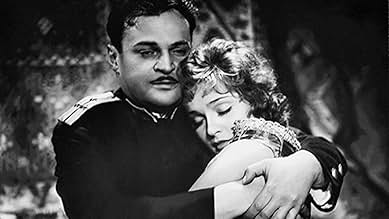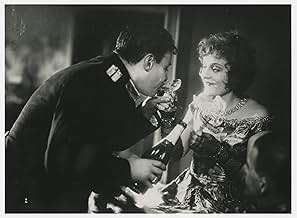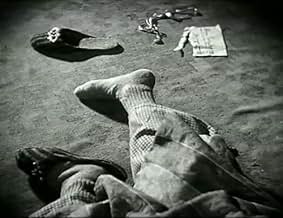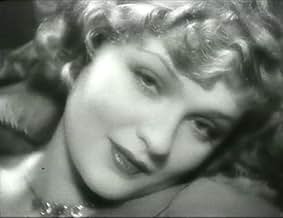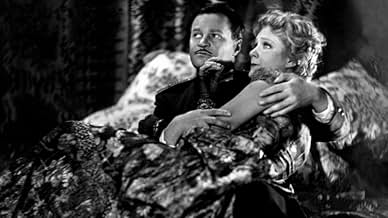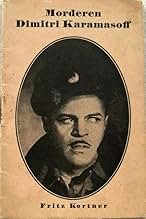Füge eine Handlung in deiner Sprache hinzuSuspicion surrounds a lieutenant for killing his father: Dimitri asks his father for his heritage. The father says he wants to marry young Grushenka. Dimitri tries to talk the girl out of th... Alles lesenSuspicion surrounds a lieutenant for killing his father: Dimitri asks his father for his heritage. The father says he wants to marry young Grushenka. Dimitri tries to talk the girl out of that plan and is himself totally smitten with her.Suspicion surrounds a lieutenant for killing his father: Dimitri asks his father for his heritage. The father says he wants to marry young Grushenka. Dimitri tries to talk the girl out of that plan and is himself totally smitten with her.
Empfohlene Bewertungen
Fjodor Ozep and Erich Engel direct this marvelous piece of early sound moviemaking, accompanied by a superb musical score by Karol Rathaus, all in tune with the mentally unstable characters and situations offered by Fyodor Dostoyevsky in his literary masterpiece, THE BROTHERS KARAMAZOV.
From my standpoint, the psychotic atmosphere amounts to the lifeblood of Dostoyevsky's work, and BROTHERS remains possibly his most "normal" book, especially when compared with THE POSSESSED (also known as THE DEVILS) and THE IDIOT.
Dmitri Karamasoff (spelling in the film) is driven by his spirit, his emotions, his mad love for Grushenka (well portrayed by the exceedingly nubile Anna Sten) even as he realizes that Katja (quietly dignified show from Hanna Waag) is probably the woman to bring peace and normality to his existence.
Interesting contribution from Fritz Rasp as Smerdiakov, "merd" short for "merde" in the much spoken French in Russian society at the time, a truly devious and evil character that has epilepsy as extenuating circumstance for his underhand behavior.
Albeit flawed and with acting from Fritz Kortner that must have complied with the requisites of his time but which in our age of the computer and communicative immediacy seems excessive, DER MORDER DMITRI KARAMASOFF posts terrific cinematography (the short sequence with the horse-drawn caleche in the Russian steppes is memorable) and a quasi-chaotic atmosphere.
PS - I can never understand how some reviewers consider a film dated or slow. A film made in the silent period, or even in the 1930s or 1950s, cannot possibly cater for the world of today, which moves at far greater speed, with verbal exchanges in real time across the globe - not to mention all the other differences since 1931.
One has to try to inhabit the movie's time in order to appreciate the high art of a DER MORDER DMITRI KARAMASOFF. 9/10.
From my standpoint, the psychotic atmosphere amounts to the lifeblood of Dostoyevsky's work, and BROTHERS remains possibly his most "normal" book, especially when compared with THE POSSESSED (also known as THE DEVILS) and THE IDIOT.
Dmitri Karamasoff (spelling in the film) is driven by his spirit, his emotions, his mad love for Grushenka (well portrayed by the exceedingly nubile Anna Sten) even as he realizes that Katja (quietly dignified show from Hanna Waag) is probably the woman to bring peace and normality to his existence.
Interesting contribution from Fritz Rasp as Smerdiakov, "merd" short for "merde" in the much spoken French in Russian society at the time, a truly devious and evil character that has epilepsy as extenuating circumstance for his underhand behavior.
Albeit flawed and with acting from Fritz Kortner that must have complied with the requisites of his time but which in our age of the computer and communicative immediacy seems excessive, DER MORDER DMITRI KARAMASOFF posts terrific cinematography (the short sequence with the horse-drawn caleche in the Russian steppes is memorable) and a quasi-chaotic atmosphere.
PS - I can never understand how some reviewers consider a film dated or slow. A film made in the silent period, or even in the 1930s or 1950s, cannot possibly cater for the world of today, which moves at far greater speed, with verbal exchanges in real time across the globe - not to mention all the other differences since 1931.
One has to try to inhabit the movie's time in order to appreciate the high art of a DER MORDER DMITRI KARAMASOFF. 9/10.
Full of atmosphere and a Slavonic, expressionistic fatalism, it is in many ways much more 'Russian' than German. Although there is a slight narrative overlap between Dostoyevsky's Karamazovs and Tolstoy's Resurrection, this does at least provide the ending of the film with a slight quantum of solace, or modicum of hope. Set within baroque interiors, the inner and outer worlds of human experience are constantly juxtaposed and shown to be in perpetual conflict. As befits Dostoyevsky, a wild anarchic spirit animates the characters as they act out their fatalistic drama, (l'amour fou, which director Fedor Otsep was later to explore in his version of Stefan Zweig's 'Amok'). All through, there is a fearful, pervading melancholy, a sense of impending doom. These are what we would today call dysfunctional characters, but they are imprisoned in the manners and mores of their time, trying to claw some small space in which they can be free, but in their innermost heart of hearts knowing that it is unlikely to be so.
First, this is simply a well made film that anyone can appreciate. You don't have to be film aficionado. You can be unfamiliar with the source material. The quality story telling alone can draw an audience in.
Second, this is the best film adaptation of a Dostoevsky novel we'll ever get I bet. While I haven't seen everything ever produced I just doubt anything else blends art with cinema the way this film has done.
Third, Orson Welles fans will find a lot to like in this movie. The leading man looks and carries himself like Welles. And there's just something about the construction of the film that reminded me of his works.
A free version exists on YouTube as of 2020 so please give it a go if curious.
Second, this is the best film adaptation of a Dostoevsky novel we'll ever get I bet. While I haven't seen everything ever produced I just doubt anything else blends art with cinema the way this film has done.
Third, Orson Welles fans will find a lot to like in this movie. The leading man looks and carries himself like Welles. And there's just something about the construction of the film that reminded me of his works.
A free version exists on YouTube as of 2020 so please give it a go if curious.
Even by today's standards, this is still a film masterpiece, but, when one considers when it was made it is even more stunning, for it is so innovative and original that it is a tragedy that it is not more widely known. Seeing it with contemporary eyes and ears, it is easy to forget that sound film was then still new and in its infancy, and yet Otsep and Karol Rathaus (given his first opportunity to compose for a film), immediately grasped the fundamental potential music could play in propelling dramatic narrative. To his eternal credit, the late, great Bernard Herrmann in a published interview, cited this film as the one he most admired for its creative use of a musical score.
The frantic coach ride, when Karamazov pursues Grushenka when she has abandoned him, must rank, even today, as one of the most dynamic scenes in world cinema. With its rapid cross cutting and editing, allied with Rathaus' incredible score, which uses frantic drumming, Chinese blocks and assorted percussion instruments, it perfectly conveys the desperation and mad love we are confronted with, and, although probably only lasting less than a minute in screen time, leaves one stunned and breathless with excitement.
Then, when Karamazov arrives at the bordello to which Grushenka has fled, can you believe, in a film shot in 1930, (when sound cameras weighed a ton), Otsep introduces an uninterrupted tracking shot, as Karmazov wanders from room to room, trailed and proceeded by the camera in real time, as he seeks to find her, which is every bit as dynamic and fascinating as the opening shot of `A Touch of Evil'?
I am convinced that Orson Welles had already seen this film before setting out to make `Citizen Kane', since so many of the innovations in that for which he was hailed, actually first appeared in Otsep's film. It is a perfect marriage of silent film montage and editing, with all the new potential that sound unleashed fully realised, and Otsep combines the two with incredible skill and mastery.
Full of atmosphere and a Slavonic expressionistic fatalism, it is in many ways much more of a `Russian' film than a German one, (it is interesting to note that a French speaking version was simultaneously filmed alongside this). Although there is a slight narrative blurring and overlap between Dostoyevsky's `Karamazov' and Tolstoy's `Resurrection', (both often filmed in any case), this does at least provide the ending of the film with a slight modicum of hope.
Set within baroque interiors which hardly ever leave any surface uncovered, unpatterned, or not seducing the eye to gain its attention, and contrasted with bleak and hostile exteriors, the inner and outer worlds of human experience are constantly juxtaposed and shown to be in perpetual conflict. If only modern film-makers would study and learn from the sheer economy of space and time used in pre-50s cinema!
As befits writers of the calibre of Dostoyevsky, (and, perhaps even more so, the borrowing from Tolstoy), a wild anarchic spirit animates the characters as they act out their fatalistic drama, (the amour fou that Otsep was later to explore in `Amok'), but, all through, and in part heightened by Rathaus' music, there is a fearful melancholy that pervades it all; a sense of impending doom. These are what we would today call dysfunctional characters, but they are imprisoned in the manners and mores of their time; trying to claw some small space in which they can be free, but in their innermost heart of hearts knowing that it is unlikely to be.
When Grushenka decides to join Karamazov in his exile in Siberia, the train which takes them away, (that constant and valuable cinematic metaphor of inevitability and mechanistic fatalism, and with hindsight, so similar to the transportations used by the Nazis ten years later), is seen vanishing into oblivion, with the camera astride the track, against which backdrop Rathaus added a musical chord sequence that borders on heartbreak, poignancy and pain.
A masterpiece of world cinema that must one day be rediscovered and given its rightful respect and critical admiration.
(A sinister footnote should perhaps mention that out-of-context sequences from this film were strung together as part of the Nazi anti-Semitic film `Der Ewige Jude', (together with scenes similarly lifted from Fritz Lang's `M'), to illustrate what were termed `degenerate Jewish influences in German cinema'. It is fortunate that Otsep and his wife were able to leave Paris where they were then living, just days before the Germans arrived during WW2, since they immediately closed all cinemas and then, after a week or so, allowed a few to re-open which were forced to show `Der Ewige Jude'. Unfortunately, Otsep's career was never able to recover and find the opportunities through which to re-establish himself as a master film craftsman in the USA, and he died in 1949).
The frantic coach ride, when Karamazov pursues Grushenka when she has abandoned him, must rank, even today, as one of the most dynamic scenes in world cinema. With its rapid cross cutting and editing, allied with Rathaus' incredible score, which uses frantic drumming, Chinese blocks and assorted percussion instruments, it perfectly conveys the desperation and mad love we are confronted with, and, although probably only lasting less than a minute in screen time, leaves one stunned and breathless with excitement.
Then, when Karamazov arrives at the bordello to which Grushenka has fled, can you believe, in a film shot in 1930, (when sound cameras weighed a ton), Otsep introduces an uninterrupted tracking shot, as Karmazov wanders from room to room, trailed and proceeded by the camera in real time, as he seeks to find her, which is every bit as dynamic and fascinating as the opening shot of `A Touch of Evil'?
I am convinced that Orson Welles had already seen this film before setting out to make `Citizen Kane', since so many of the innovations in that for which he was hailed, actually first appeared in Otsep's film. It is a perfect marriage of silent film montage and editing, with all the new potential that sound unleashed fully realised, and Otsep combines the two with incredible skill and mastery.
Full of atmosphere and a Slavonic expressionistic fatalism, it is in many ways much more of a `Russian' film than a German one, (it is interesting to note that a French speaking version was simultaneously filmed alongside this). Although there is a slight narrative blurring and overlap between Dostoyevsky's `Karamazov' and Tolstoy's `Resurrection', (both often filmed in any case), this does at least provide the ending of the film with a slight modicum of hope.
Set within baroque interiors which hardly ever leave any surface uncovered, unpatterned, or not seducing the eye to gain its attention, and contrasted with bleak and hostile exteriors, the inner and outer worlds of human experience are constantly juxtaposed and shown to be in perpetual conflict. If only modern film-makers would study and learn from the sheer economy of space and time used in pre-50s cinema!
As befits writers of the calibre of Dostoyevsky, (and, perhaps even more so, the borrowing from Tolstoy), a wild anarchic spirit animates the characters as they act out their fatalistic drama, (the amour fou that Otsep was later to explore in `Amok'), but, all through, and in part heightened by Rathaus' music, there is a fearful melancholy that pervades it all; a sense of impending doom. These are what we would today call dysfunctional characters, but they are imprisoned in the manners and mores of their time; trying to claw some small space in which they can be free, but in their innermost heart of hearts knowing that it is unlikely to be.
When Grushenka decides to join Karamazov in his exile in Siberia, the train which takes them away, (that constant and valuable cinematic metaphor of inevitability and mechanistic fatalism, and with hindsight, so similar to the transportations used by the Nazis ten years later), is seen vanishing into oblivion, with the camera astride the track, against which backdrop Rathaus added a musical chord sequence that borders on heartbreak, poignancy and pain.
A masterpiece of world cinema that must one day be rediscovered and given its rightful respect and critical admiration.
(A sinister footnote should perhaps mention that out-of-context sequences from this film were strung together as part of the Nazi anti-Semitic film `Der Ewige Jude', (together with scenes similarly lifted from Fritz Lang's `M'), to illustrate what were termed `degenerate Jewish influences in German cinema'. It is fortunate that Otsep and his wife were able to leave Paris where they were then living, just days before the Germans arrived during WW2, since they immediately closed all cinemas and then, after a week or so, allowed a few to re-open which were forced to show `Der Ewige Jude'. Unfortunately, Otsep's career was never able to recover and find the opportunities through which to re-establish himself as a master film craftsman in the USA, and he died in 1949).
Wusstest du schon
- WissenswertesLaurie Lane's debut.
- VerbindungenAlternate-language version of Les frères Karamazoff (1931)
Top-Auswahl
Melde dich zum Bewerten an und greife auf die Watchlist für personalisierte Empfehlungen zu.
Details
- Erscheinungsdatum
- Herkunftsland
- Sprache
- Auch bekannt als
- Ubica Dimitrije Karamazov
- Produktionsfirma
- Weitere beteiligte Unternehmen bei IMDbPro anzeigen
- Laufzeit1 Stunde 33 Minuten
- Farbe
- Sound-Mix
- Seitenverhältnis
- 1.20 : 1
Zu dieser Seite beitragen
Bearbeitung vorschlagen oder fehlenden Inhalt hinzufügen

Oberste Lücke
By what name was Der Mörder Dimitri Karamasoff (1931) officially released in Canada in English?
Antwort
